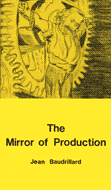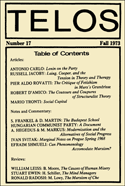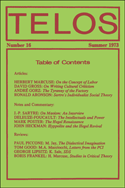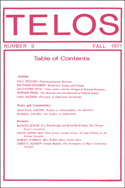By Frederick H. Pitts · Tuesday, April 2, 2013 This is the second of two blog posts by Frederick H. Pitts that reassess the importance and impact of Jean Baudrillard’s The Mirror of Production. Read the first post here. Where the first post dealt with Baudrillard’s criticism of the productivism of political economy and its Marxist critique, the second deals with the implications of Baudrillard’s critical analysis for any radical alternative to production.
 In the first post, we explored Baudrillard’s critique of productivism. The attributing of some kind of essential humanity to labor is identified by Baudrillard as one of the most pernicious effects of the productivism in political economy, Marx included. Indeed, humanism itself can be seen as the “product” of political economy (Baudrillard, 22). Taking over the “phantasm” of “labor as the human essence” from political economy, Baudrillard suggests Marx projected this understanding upon the working class as “their central means of self-comprehension.” Rather than maintaining a narrow fixation on the condition of one’s exploitation as labor as the means by which this exploitation can be transcended, Baudrillard argues that workers must liberate themselves from the status of “labor-power,” and “think themselves under another sign than that of production” (Poster, 3). In the first post, we explored Baudrillard’s critique of productivism. The attributing of some kind of essential humanity to labor is identified by Baudrillard as one of the most pernicious effects of the productivism in political economy, Marx included. Indeed, humanism itself can be seen as the “product” of political economy (Baudrillard, 22). Taking over the “phantasm” of “labor as the human essence” from political economy, Baudrillard suggests Marx projected this understanding upon the working class as “their central means of self-comprehension.” Rather than maintaining a narrow fixation on the condition of one’s exploitation as labor as the means by which this exploitation can be transcended, Baudrillard argues that workers must liberate themselves from the status of “labor-power,” and “think themselves under another sign than that of production” (Poster, 3).
Continue reading →
By Frederick H. Pitts · Tuesday, March 26, 2013  It seems an apt time to reassess the importance and impact of Jean Baudrillard’s The Mirror of Production. Several reasons spring to mind. We are approaching, in 2013, the 40th anniversary of the original French publication. Since the publication of the translated version in 1975 by Telos Press, the themes presented in the book have gained increasing contemporary currency, not least in popular critiques of production such as Kathi Weeks’s recent The Problem With Work (2012) and the growing literature on Italian autonomist theory. Finally, the passing in October 2012 of Mark Poster, responsible for the book’s translation into English, invites us to consider his excellent introduction and condensation of Baudrillard’s complex and challenging argument. In two blog posts, appearing today and next week, I will discuss some of the central themes of The Mirror of Production and attempt to relate them to broader intellectual currents and issues. Today’s post deals with the critical analysis that Baudrillard offers of the perceived “productivism” of both political economy and its Marxist critique. It seems an apt time to reassess the importance and impact of Jean Baudrillard’s The Mirror of Production. Several reasons spring to mind. We are approaching, in 2013, the 40th anniversary of the original French publication. Since the publication of the translated version in 1975 by Telos Press, the themes presented in the book have gained increasing contemporary currency, not least in popular critiques of production such as Kathi Weeks’s recent The Problem With Work (2012) and the growing literature on Italian autonomist theory. Finally, the passing in October 2012 of Mark Poster, responsible for the book’s translation into English, invites us to consider his excellent introduction and condensation of Baudrillard’s complex and challenging argument. In two blog posts, appearing today and next week, I will discuss some of the central themes of The Mirror of Production and attempt to relate them to broader intellectual currents and issues. Today’s post deals with the critical analysis that Baudrillard offers of the perceived “productivism” of both political economy and its Marxist critique.
Continue reading →
By Frederick H. Pitts · Monday, August 13, 2012 As an occasional feature on TELOSscope, we highlight a past Telos article whose critical insights continue to illuminate our thinking and challenge our assumptions. Today, Frederick H. Pitts looks at Mario Tronti’s “Social Capital” in Telos 17 (Fall 1973). An earlier post on Tronti’s critique of trade unionism appeared on Friday.
 In a previous post, I discussed Tronti’s critique of trade unionism. Here I investigate the suggestions Tronti offers as to how the complete integration of organized labor within the capitalist system can be surpassed in order to erect an effective working-class challenge against capitalist domination. Tronti begins his piece “Social Capital” by outlining the way in which fully developed capitalism witnesses the all-encompassing socialization of the class relation. The unorthodox and controversial appeal of Tronti’s text consists precisely in the way in which he treats class struggle not as some external hazard facing capitalism, but as an integral part of its operation as a system. The class struggle, far from posing a threat to capital, becomes a constitutive part of its reproduction, maintaining the collective capitalist and collective workers as clearly demarcated and, crucially, organized participants in the continuing success of the system. Trade unions, for Tronti, perform the valuable role of organizing workers as a working class so that they can assume their position in capitalist production. In a previous post, I discussed Tronti’s critique of trade unionism. Here I investigate the suggestions Tronti offers as to how the complete integration of organized labor within the capitalist system can be surpassed in order to erect an effective working-class challenge against capitalist domination. Tronti begins his piece “Social Capital” by outlining the way in which fully developed capitalism witnesses the all-encompassing socialization of the class relation. The unorthodox and controversial appeal of Tronti’s text consists precisely in the way in which he treats class struggle not as some external hazard facing capitalism, but as an integral part of its operation as a system. The class struggle, far from posing a threat to capital, becomes a constitutive part of its reproduction, maintaining the collective capitalist and collective workers as clearly demarcated and, crucially, organized participants in the continuing success of the system. Trade unions, for Tronti, perform the valuable role of organizing workers as a working class so that they can assume their position in capitalist production.
Continue reading →
By Frederick H. Pitts · Friday, August 10, 2012 As an occasional feature on TELOSscope, we highlight a past Telos article whose critical insights continue to illuminate our thinking and challenge our assumptions. Today, Frederick H. Pitts looks at Mario Tronti’s “Social Capital” in Telos 17 (Fall 1973). A second post on Tronti’s article will follow on Monday.
 The labor movement is in crisis, with trade union density falling and its political parties increasingly discredited by their complicity with capitalist austerity programs. New fronts of anti-capitalist activity have been opened, away from the traditional structures of socialism and working-class organization, including the trade unions and the parties of labor. Mario Tronti’s article “Social Capital,” from 1973, presents a critique of trade unionism that possesses significant contemporary relevance in the light of these developments. Tronti presents trade unions as a central element in the capitalist regulation and organization of workers. The fatally compromised nature of trade unions under capital points the way toward different means of building struggles based not upon the maintenance of a status within society as “workers” but along alternative matrices of identity. An example is the Occupy movement’s clarion call of the 99% stacked against capital. The labor movement is in crisis, with trade union density falling and its political parties increasingly discredited by their complicity with capitalist austerity programs. New fronts of anti-capitalist activity have been opened, away from the traditional structures of socialism and working-class organization, including the trade unions and the parties of labor. Mario Tronti’s article “Social Capital,” from 1973, presents a critique of trade unionism that possesses significant contemporary relevance in the light of these developments. Tronti presents trade unions as a central element in the capitalist regulation and organization of workers. The fatally compromised nature of trade unions under capital points the way toward different means of building struggles based not upon the maintenance of a status within society as “workers” but along alternative matrices of identity. An example is the Occupy movement’s clarion call of the 99% stacked against capital.
Continue reading →
By Frederick H. Pitts · Tuesday, July 17, 2012 As an occasional feature on TELOSscope, we highlight a past Telos article whose critical insights continue to illuminate our thinking and challenge our assumptions. Today, Frederick H. Pitts looks at Herbert Marcuse’s “On the Philosophical Foundation of the Concept of Labor in Economics” from Telos 16 (Summer 1973).
 In his 1933 essay “On the Philosophical Foundation of the Concept of Labor in Economics,” Marcuse’s thesis is that the conception of labor as economic activity gives a one-sided picture of human praxis. According to Marcuse, such a conceptualization overlooks the way in which labor is an eternal condition of human existence geared toward self-creation and becoming. Marcuse’s elucidation of these issues invites contention. As Douglas Kellner asserts in his introduction to the essay, the two principal problems with Marcuse’s position pertain to the way in which labor is, on the one hand, presented as an entirely trans- or a-historical phenomenon, capable only of being “liberated” rather than offering the possibility of being “liberated from,” and, on the other, associated with an absolutized self through the process of labor-as-becoming, holding subjectivity to be forged consciously rather than foisted upon oneself from outside (Kellner, 3–6). To these I would add a related third, which is that an economic perspective such as that challenged by Marcuse is necessary to rectify the first and second stumbling blocks. In spite of this, as we shall see, Marcuse’s theorization of the philosophical and economic conceptualization of labor might provide useful insights for a rethink of productive activity in the context of contemporary capitalism. In his 1933 essay “On the Philosophical Foundation of the Concept of Labor in Economics,” Marcuse’s thesis is that the conception of labor as economic activity gives a one-sided picture of human praxis. According to Marcuse, such a conceptualization overlooks the way in which labor is an eternal condition of human existence geared toward self-creation and becoming. Marcuse’s elucidation of these issues invites contention. As Douglas Kellner asserts in his introduction to the essay, the two principal problems with Marcuse’s position pertain to the way in which labor is, on the one hand, presented as an entirely trans- or a-historical phenomenon, capable only of being “liberated” rather than offering the possibility of being “liberated from,” and, on the other, associated with an absolutized self through the process of labor-as-becoming, holding subjectivity to be forged consciously rather than foisted upon oneself from outside (Kellner, 3–6). To these I would add a related third, which is that an economic perspective such as that challenged by Marcuse is necessary to rectify the first and second stumbling blocks. In spite of this, as we shall see, Marcuse’s theorization of the philosophical and economic conceptualization of labor might provide useful insights for a rethink of productive activity in the context of contemporary capitalism.
Continue reading →
By Frederick H. Pitts · Tuesday, July 10, 2012 As an occasional feature on TELOSscope, we highlight a past Telos article whose critical insights continue to illuminate our thinking and challenge our assumptions. Today, Frederick H. Pitts looks at Salvatore Veca’s “Value, Labor, and the Critique of Political Economy” from Telos 9 (Fall 1971).
Capital is dead labor which, vampire-like, lives only by sucking living labor, and lives the more, the more labor it sucks.
—Karl Marx, Capital
 Salvatore Veca’s 1971 essay “Value, Labor, and the Critique of Political Economy” summarizes the treatment of contained and required labor in Adam Smith, David Ricardo, and Karl Marx. Most interesting is the manner in which Veca temporalizes this distinction in political economy. He draws our attention to the opposition between past labor and present, dead labor and living; namely, “the dominance of past, materialized, accumulated labor over immediate, living labor”: Salvatore Veca’s 1971 essay “Value, Labor, and the Critique of Political Economy” summarizes the treatment of contained and required labor in Adam Smith, David Ricardo, and Karl Marx. Most interesting is the manner in which Veca temporalizes this distinction in political economy. He draws our attention to the opposition between past labor and present, dead labor and living; namely, “the dominance of past, materialized, accumulated labor over immediate, living labor”:
Starting from the analysis of the typical character of labor, it is possible to reconstruct towards the surface of the system the progressive stratifications and determinations of a totality which must, however, be traced back to its base, i.e., to that unequal exchange which contaminates the world of commodities and which reveals the class violence, the elementary mechanism of exploitation, and the dominance of dead labor over living labor.
Veca presents the same temporal picture of past and present labor that moved Marx to crisscross Capital with a metaphorical cast of ghostly manifestations, vampires, and the undead. Veca’s paper suggests the extent to which Marx’s range of metaphors is no mere literary conceit, but rather it is a key feature of fundamental theoretical nodes in his critique of political economy. As we shall see, the specter of dead labor has deeper conceptual foundations in Marx’s forerunners, but this idea also has contemporary relevance with reference to present-day philosophical trends.
Continue reading →
|
|
 In the first post, we explored Baudrillard’s critique of productivism. The attributing of some kind of essential humanity to labor is identified by Baudrillard as one of the most pernicious effects of the productivism in political economy, Marx included. Indeed, humanism itself can be seen as the “product” of political economy (Baudrillard, 22). Taking over the “phantasm” of “labor as the human essence” from political economy, Baudrillard suggests Marx projected this understanding upon the working class as “their central means of self-comprehension.” Rather than maintaining a narrow fixation on the condition of one’s exploitation as labor as the means by which this exploitation can be transcended, Baudrillard argues that workers must liberate themselves from the status of “labor-power,” and “think themselves under another sign than that of production” (Poster, 3).
In the first post, we explored Baudrillard’s critique of productivism. The attributing of some kind of essential humanity to labor is identified by Baudrillard as one of the most pernicious effects of the productivism in political economy, Marx included. Indeed, humanism itself can be seen as the “product” of political economy (Baudrillard, 22). Taking over the “phantasm” of “labor as the human essence” from political economy, Baudrillard suggests Marx projected this understanding upon the working class as “their central means of self-comprehension.” Rather than maintaining a narrow fixation on the condition of one’s exploitation as labor as the means by which this exploitation can be transcended, Baudrillard argues that workers must liberate themselves from the status of “labor-power,” and “think themselves under another sign than that of production” (Poster, 3).  In a
In a  In his 1933 essay “On the Philosophical Foundation of the Concept of Labor in Economics,” Marcuse’s thesis is that the conception of labor as economic activity gives a one-sided picture of human praxis. According to Marcuse, such a conceptualization overlooks the way in which labor is an eternal condition of human existence geared toward self-creation and becoming. Marcuse’s elucidation of these issues invites contention. As Douglas Kellner asserts in his introduction to the essay, the two principal problems with Marcuse’s position pertain to the way in which labor is, on the one hand, presented as an entirely trans- or a-historical phenomenon, capable only of being “liberated” rather than offering the possibility of being “liberated from,” and, on the other, associated with an absolutized self through the process of labor-as-becoming, holding subjectivity to be forged consciously rather than foisted upon oneself from outside (Kellner, 3–6). To these I would add a related third, which is that an economic perspective such as that challenged by Marcuse is necessary to rectify the first and second stumbling blocks. In spite of this, as we shall see, Marcuse’s theorization of the philosophical and economic conceptualization of labor might provide useful insights for a rethink of productive activity in the context of contemporary capitalism.
In his 1933 essay “On the Philosophical Foundation of the Concept of Labor in Economics,” Marcuse’s thesis is that the conception of labor as economic activity gives a one-sided picture of human praxis. According to Marcuse, such a conceptualization overlooks the way in which labor is an eternal condition of human existence geared toward self-creation and becoming. Marcuse’s elucidation of these issues invites contention. As Douglas Kellner asserts in his introduction to the essay, the two principal problems with Marcuse’s position pertain to the way in which labor is, on the one hand, presented as an entirely trans- or a-historical phenomenon, capable only of being “liberated” rather than offering the possibility of being “liberated from,” and, on the other, associated with an absolutized self through the process of labor-as-becoming, holding subjectivity to be forged consciously rather than foisted upon oneself from outside (Kellner, 3–6). To these I would add a related third, which is that an economic perspective such as that challenged by Marcuse is necessary to rectify the first and second stumbling blocks. In spite of this, as we shall see, Marcuse’s theorization of the philosophical and economic conceptualization of labor might provide useful insights for a rethink of productive activity in the context of contemporary capitalism.  Salvatore Veca’s 1971 essay “Value, Labor, and the Critique of Political Economy” summarizes the treatment of contained and required labor in Adam Smith, David Ricardo, and Karl Marx. Most interesting is the manner in which Veca temporalizes this distinction in political economy. He draws our attention to the opposition between past labor and present, dead labor and living; namely, “the dominance of past, materialized, accumulated labor over immediate, living labor”:
Salvatore Veca’s 1971 essay “Value, Labor, and the Critique of Political Economy” summarizes the treatment of contained and required labor in Adam Smith, David Ricardo, and Karl Marx. Most interesting is the manner in which Veca temporalizes this distinction in political economy. He draws our attention to the opposition between past labor and present, dead labor and living; namely, “the dominance of past, materialized, accumulated labor over immediate, living labor”: 

